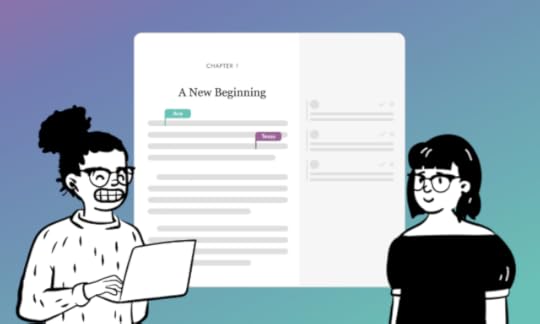Beyond the Word Count: A Book Editor’s Guide to Writing a First Draft
 ALT
ALTEvery year, we’re lucky to have great sponsors for our nonprofit events. First Draft Pro, a 2023 NaNoWriMo sponsor, is a beautifully designed writing app for fiction writers. Today, they’ve partnered with Kelly Norwood-Young, former book editor for Pan Macmillan and Penguin Random House, to bring you some pro tips on writing your first draft:
In my career as a book editor, I’ve reviewed hundreds of manuscripts. I’ve seen the joy of authors creating compelling tales, but also how disheartening it can be to rewrite a disjointed story. I’m here to give you some strategies to address common pitfalls so that you not only reach your NaNoWriMo goal, but also lay the groundwork for a manuscript that truly deserves to be called a gripping novel.
1. Have a plan.Even if you’re more of a ‘pantser’ than a ‘planner’, it’s really helpful to have an outline. I have two favourite approaches for this: the structure-first approach, and what I call the ‘Phoebe Waller-Bridge approach’.
The structure-first approachThere are a lot of narrative frameworks for story structure, but the most foundational in Western fiction is the three-act structure. Here’s a handy guide that breaks each of the classical three acts into a day-by-day guide to NaNoWriMo:
8-day guide to Act 114-day guide to Act 28-day guide to Act 3The Phoebe Waller-Bridge approachI love this quote from Phoebe Waller-Bridge: ‘I’ve never thought structure first. I’ve always thought material first, jokes first, character first … But knowing the end really helps. Then you just go as far away from the end emotionally as you possibly can.’
Sketch out your major story arcs, your character’s desires and conflicts, and the world they inhabit. The more you know your story’s world and inhabitants, the less you’ll stray into scenes that lack purpose or create plot and character inconsistencies.
2. Keep the story moving.Each word needs to propel your story forward. Superfluous details or tangents that don’t serve the narrative stall the momentum you’re trying to generate for your reader.
There’s a trick you can use to move your story forward, called the question of reversibility. Ask yourself: How difficult would it be for my character to reverse their decision? The harder it would be for them to turn back, the more you’ve moved the plot forward.
3. Plant clues carefully.Plant important elements early and make sure every element, however subtle, serves a purpose (i.e. Chekhov’s Gun).
Be sure to set up necessary components for your climax so that you can steer clear of Deus ex Machina (having that strong outline will help you here), and avoid red herrings unless they serve a clear, meaningful purpose (e.g. you’re writing a mystery and your readers expect some false leads). Misleading your readers without a payoff can erode their trust.
4. Write for the reader, not yourself.‘There is only one thing you write for yourself, and that is a shopping list,’ insists Umberto Eco in On Literature. Even if writing, for you, is a therapeutic outlet, a form of self-expression, or a way to leave a legacy, you’re still writing to say something to someone else. Your story simply won’t be as strong if you forget your reader’s perspective.
5. Keep daily editorial notes for your future self.While editing should wait until at least December, end each day with a brief reflection, noting any off-course deviations, potential inconsistencies, areas to research further, or moments of inspiration to revisit when you start editing.
These daily notes will be invaluable during the editing process, helping you to remember insights that are no longer fresh when you come back to the manuscript later.
6. Embrace the first-draft mentality.There’s a lot you can do to ensure that your first draft is the best it can be before the end of November—but just as important is to understand that all first drafts have flaws.
As a book editor, I’ve witnessed manuscripts transform, sometimes unrecognizably, from their first drafts. Embrace the uncertainty and creative detours—because it’s from this beautiful chaos that your story will find its true voice.
Kelly Norwood-Young is a seasoned book editor and proofreader with comprehensive experience across various facets of manuscript editing. Her background includes roles at Pan Macmillan and Penguin Books, extending into a successful freelance career working with award-winning authors. Kelly’s work, known for its precision and sensitivity to the author’s voice, has been integral to the success of both new and established writers globally.
Try out First Draft Pro: All NaNoWriMo participants can use the discount code NANOWRIMO2023 for 20% off a premium subscription to First Draft Pro! Offer expires January 31, 2024.
Chris Baty's Blog
- Chris Baty's profile
- 63 followers



